AN ALMOST IMPERCEPTIBLE SHADOW
Danna Singer in conversation with Lindley Warren Mickunas
Lindley Warren Mickunas Something that appeals to me about If It Rained an Ocean is the presence of a multilayered perspective. You are both insider and outsider—in the sense that you grew up in, but later left, the New Jersey neighborhood where the series takes place. How do you view yourself in relation to these photographs?
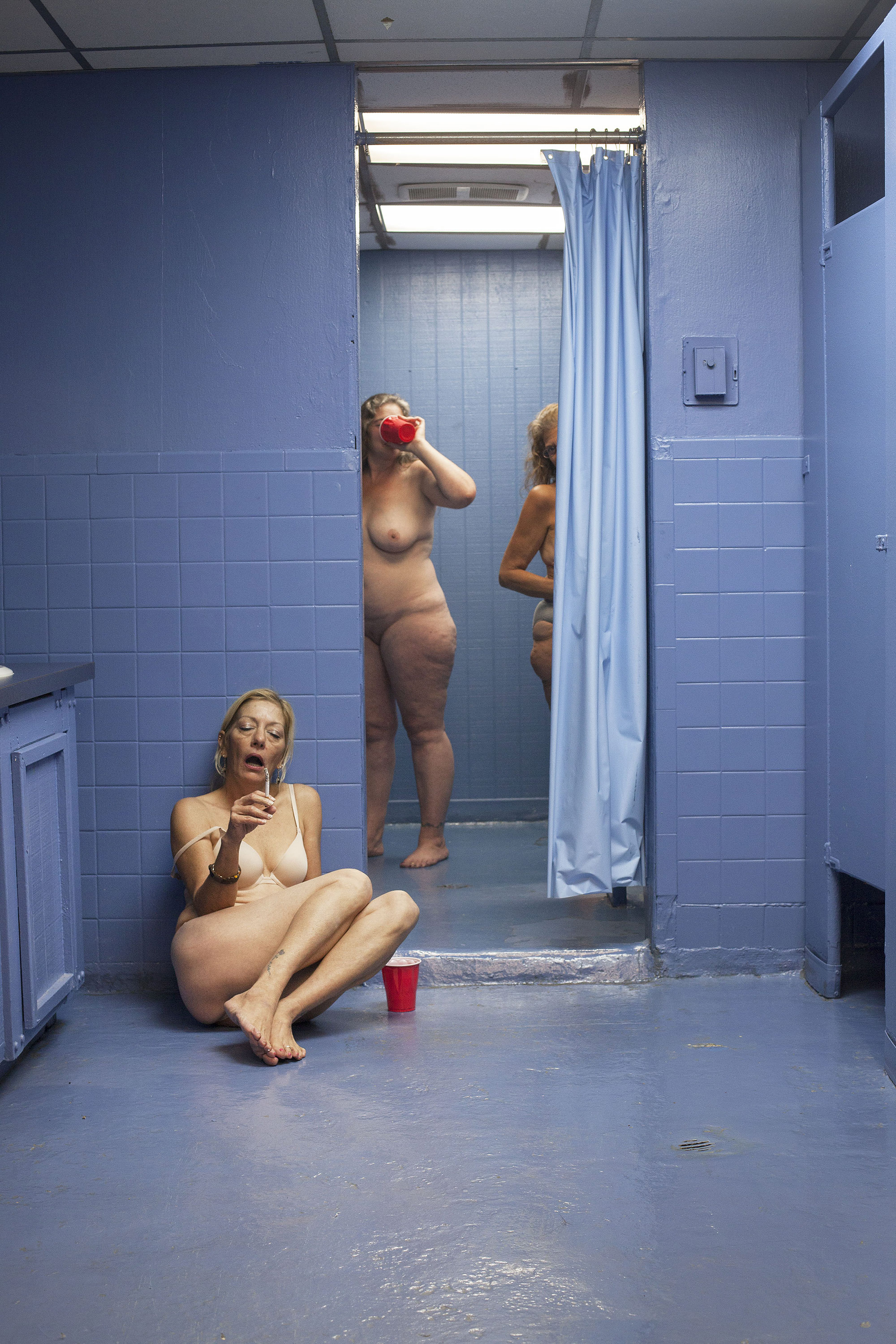
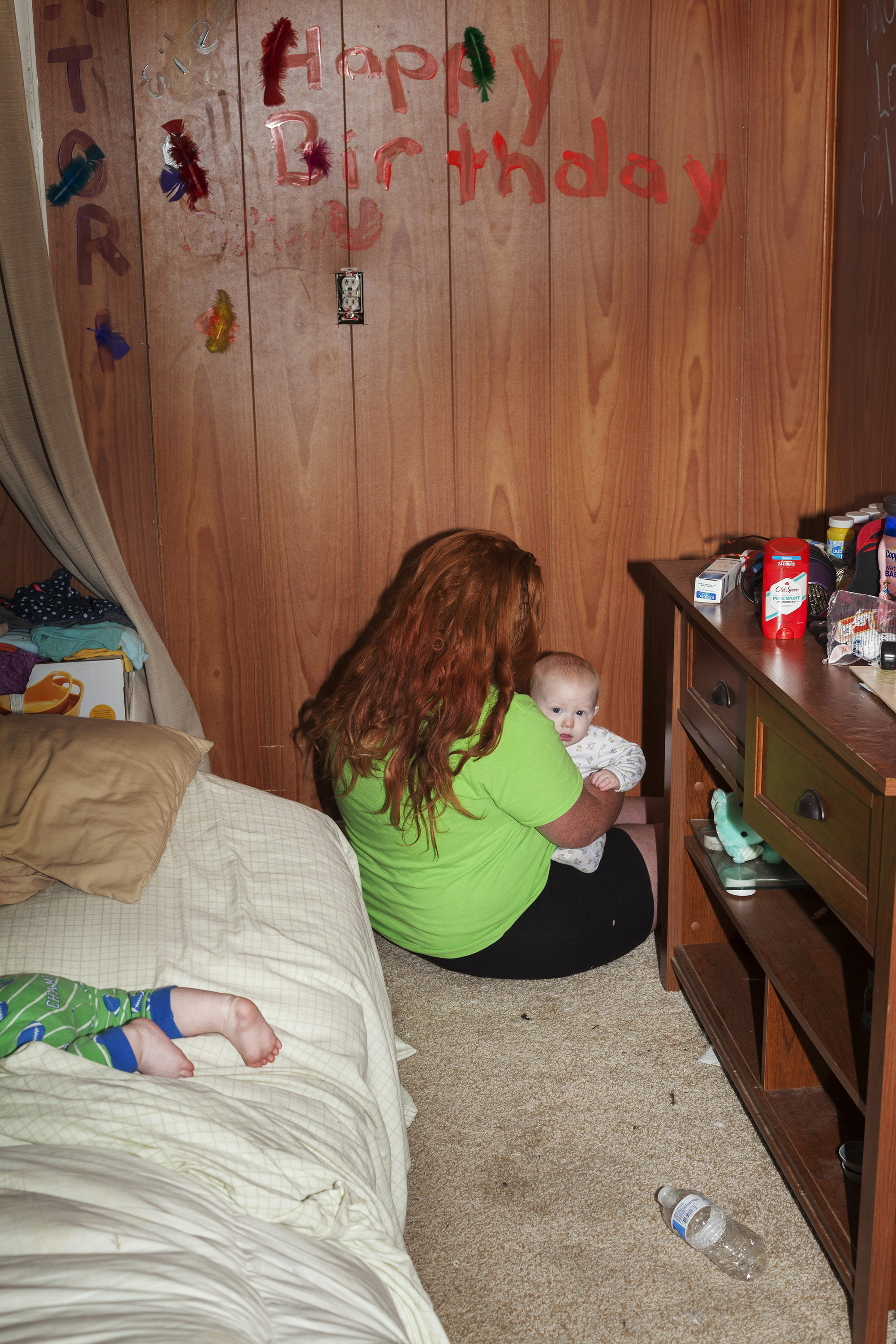
Danna Singer I see myself as both and for the very reasons you articulated. I left my hometown when I was 23 and have lived in several places since. My leaving changed things, as it often does but I am still connected to the place. Most of the people I photograph are close to me and the ideas in my photographs reflect many of my own experiences and that keeps my position in the work as very much an insider.
Lindley That perspective is felt in your images. They're unflinching. What is it that you hope to communicate to those who don't have the same lived experience that you do?
Danna I hope the work communicates the oppressiveness of classism and what it feels like to live in these spaces. I wanted to make images that were claustrophobic and unrelenting, like the daily lives of many of the working-poor in America. There are so few opportunities in working-class communities that its psychological damage is massive. There is a corrosiveness in the lack of possibility, and I tried to get at that with my edit. It needed to feel insistent.
Lindley You're very successful at doing this, Danna. There are so many nuances and layers in your work that I really appreciate. You beg the viewer to take a deeper look at what you're showing them. One example is through reflections, which often show additional subjects within the frame, such as in Mother and Daughter and Ellen. Can you tell me about this visual tool you use and also about these two images?
Danna Thanks, Lindley. I like using reflections when I can. They often manage to introduce ideas in a photograph without hitting you over the head with them. Reflections let the viewer in on what's happening outside the frame and also create a depth and space that can either intrude on or compliment the narrative. I think a lot about Wim Wenders’ Paris, Texas. I am inspired by his use of reflection, color and composition.
With Mother and Daughter, I wanted the image of the mother to exist as an almost imperceptible shadow in the frame. She becomes an onlooker, a passive figure who recedes into the landscape. It was a way for me to begin to describe family cycles and how children are sometimes left to manage on their own. In the image Ellen, I used the mirror to create a relationship with the looming male presence and Ellen. I think there is a tension between her gaze and his figure, and the reflection is a tool that brings us to that moment.
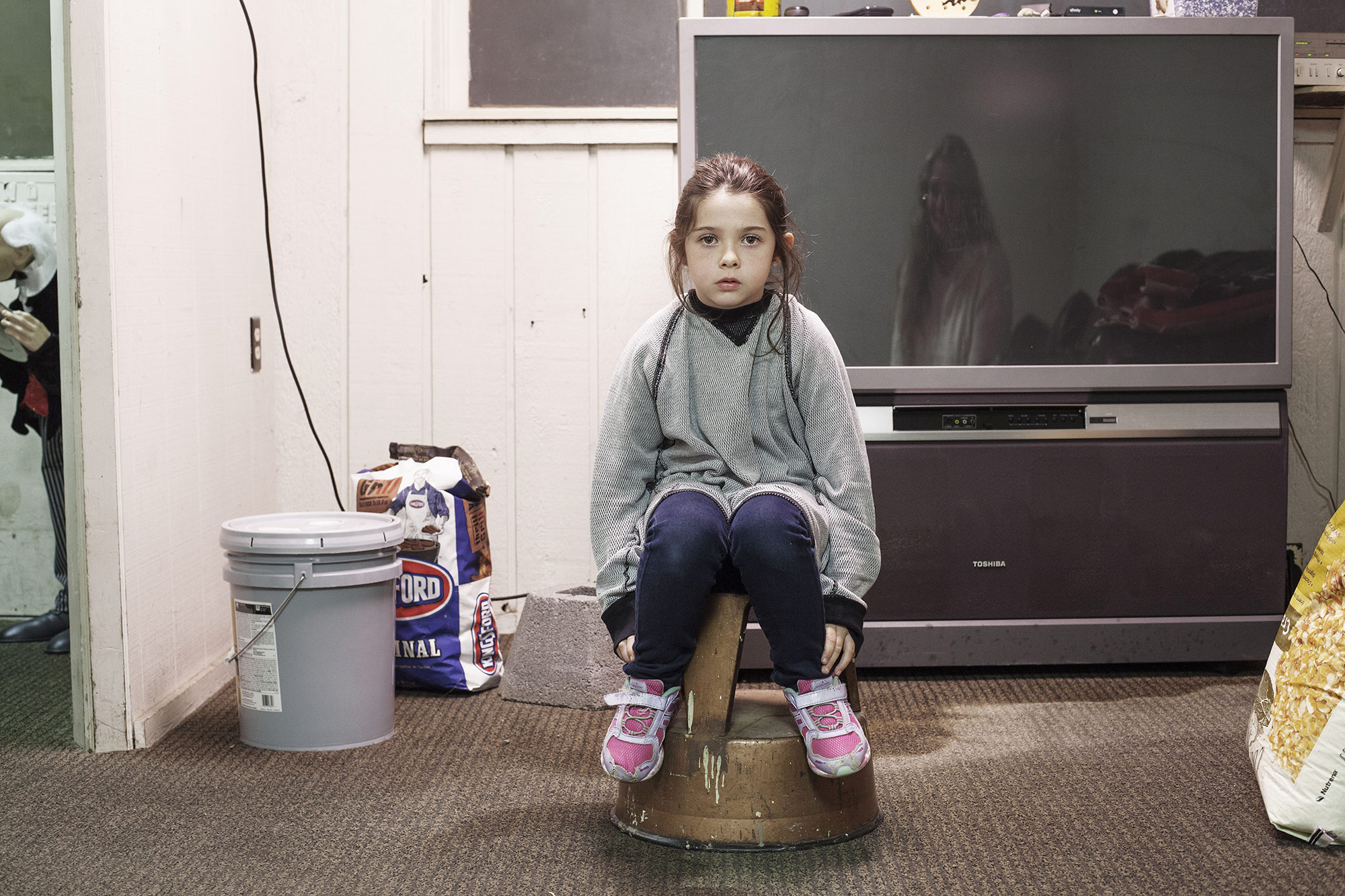
Mother and Daughter, 2016
Lindley Correct me if I’m wrong, but the people shown in Mother and Daughter and Ellen aren’t family members of yours, are they? When did you decide to branch out beyond photographing your family and what was the significance of this for you?
Danna The child in the image Mother and Daughter is my niece’s half-sister Jessica. I photograph her a lot. Her father and my sister were together for a few years when they were in their teens. They had my niece Alexis and we have all been in each other’s lives since. And so, I feel connected to her and her parents in a very familial way. The branching out in the work from family to family friends (like Ellen), and people related to my old neighborhood wasn’t by design, it happened organically. I saw a photograph of an old friend on Facebook and I wanted to photograph him, so I reached out. It felt right because our neighborhood was tight and so I followed that thread and the work opened up from there.
Danna The child in the image Mother and Daughter is my niece’s half-sister Jessica. I photograph her a lot. Her father and my sister were together for a few years when they were in their teens. They had my niece Alexis and we have all been in each other’s lives since. And so, I feel connected to her and her parents in a very familial way. The branching out in the work from family to family friends (like Ellen), and people related to my old neighborhood wasn’t by design, it happened organically. I saw a photograph of an old friend on Facebook and I wanted to photograph him, so I reached out. It felt right because our neighborhood was tight and so I followed that thread and the work opened up from there.

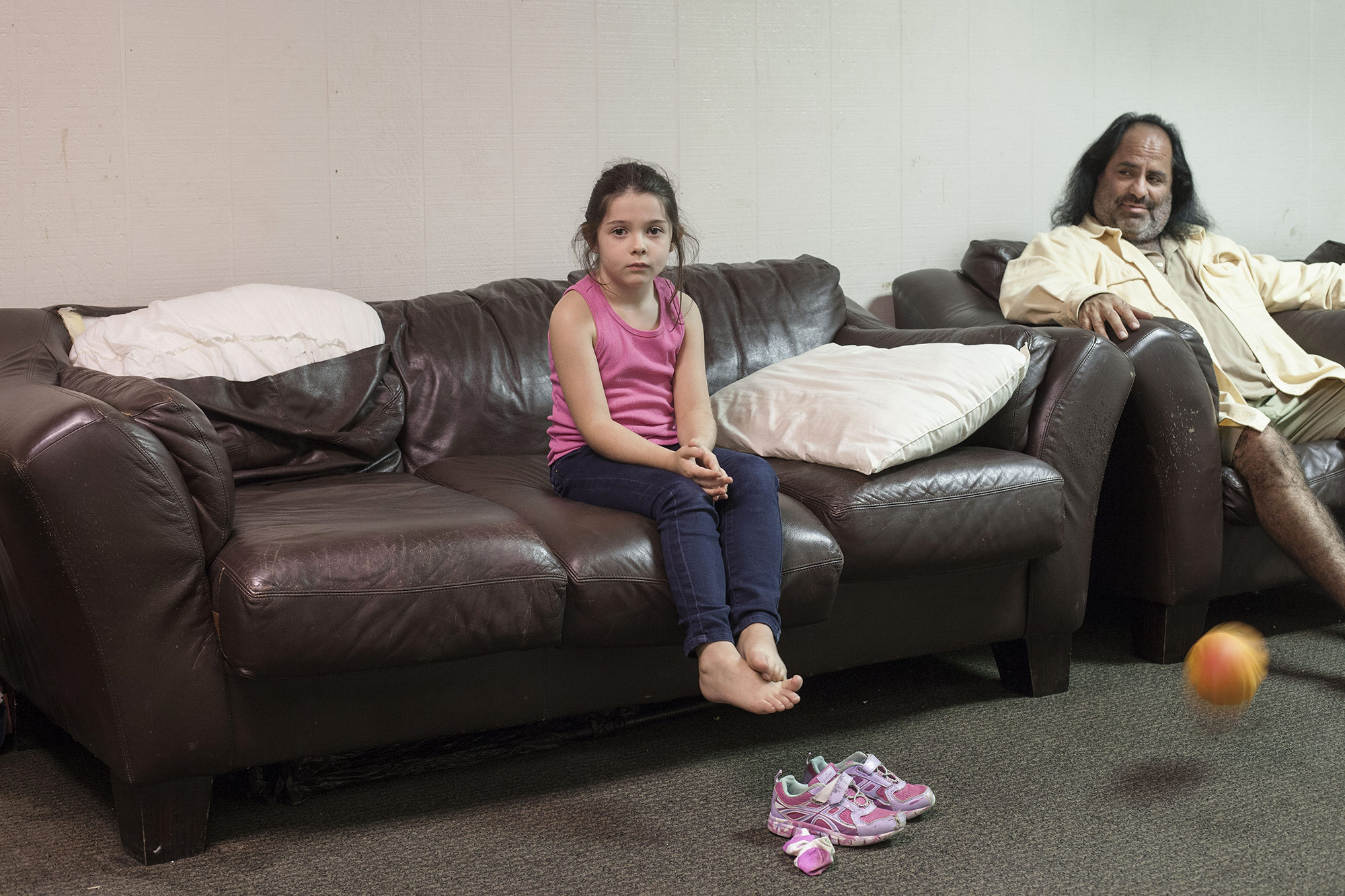

Lindley I find that it's really important to allow yourself to be open to the work taking you in directions that perhaps you didn't originally intend. What have you learned through the process of making the images both as photographer and otherwise?
Danna As a photographer, I learned that I get the greatest satisfaction out of working slowly and that I am most excited by building a picture from the ground up. I like to sit with the architecture of a place and then arrange figures in space until I’ve exhausted just about every possibility. And maybe it shouldn’t come as any great surprise, that in the end, the work revealed itself as a self-portrait. It essentially winds its way through the landscape of my own history while pointing the camera in the direction of others. That’s not to say these images aren’t about the subjects as well, but I chose to make the pictures I did because I was responding to the memory of my own experience.
Lindley It’s funny when obvious things don’t become apparent until much later in the working process. This reminds me, some time ago you posted an image on your Instagram and wrote “An overlooked picture in my archives.” I find it very striking and honestly, I don’t know how it slipped through the cracks! It makes me think of Andrea Modica’s Treadwell (especially her image of a little girl and a pair of dirty socks on an uncovered mattress) for a few reasons, one being that it’s so rewarding to look at all the details within it – it’s a photo that keeps giving. Tell me about this image. Why didn’t it work for you before?
Danna Wow, that’s quite a compliment. I think Andrea’s work is just stunning. She is a true technician, an artist with complete mastery of her craft and such finesse in her visual language. I aspire to have such command. And so, to your question, I didn’t feel that I had any of that with the image Happy Birthday and so I dismissed it. The paneling and the lack of color separation between the mother’s hair and the wood was the main problem. I was being too obsessive. I shot that picture on two different occasions. I brought in lights for one shoot and it wasn’t working for me, then I hit it with flash and still I was disappointed. It went into the discard pile until last summer when I found it again with fresh eyes. I had this idea of what the picture should have been and wasn’t seeing it for what it was. It’s funny how life can be that way too. When you try to impose your will so strongly, you can’t see the forest through the trees.
Lindley I can definitely relate to that. With regard to seeing things for what they are, how do you navigate the more complicated aspects of what you photograph? Why is it important for you to show things that are sometimes difficult to look at?
Danna Many of my photographs deal with difficult subject matter and it gets emotional for me. Before almost every shoot, I want to cancel. I convince myself of some reason why I shouldn't go and then spend a lot of time talking myself back into working. I get frightened that I won’t make a good picture, or I worry about the emotional energy it will take to put myself out there to get the pictures I want.
In the end, I go because my ambition is greater than my fear and because working makes me feel better. If I were a writer, I would write it all down, but I’m not, so I say things in the way that I know how and that’s with images. I think it’s important to say something real, to be vulnerable, to have something at stake. The viewer can feel that. I know I do when I see it.
Danna As a photographer, I learned that I get the greatest satisfaction out of working slowly and that I am most excited by building a picture from the ground up. I like to sit with the architecture of a place and then arrange figures in space until I’ve exhausted just about every possibility. And maybe it shouldn’t come as any great surprise, that in the end, the work revealed itself as a self-portrait. It essentially winds its way through the landscape of my own history while pointing the camera in the direction of others. That’s not to say these images aren’t about the subjects as well, but I chose to make the pictures I did because I was responding to the memory of my own experience.
Lindley It’s funny when obvious things don’t become apparent until much later in the working process. This reminds me, some time ago you posted an image on your Instagram and wrote “An overlooked picture in my archives.” I find it very striking and honestly, I don’t know how it slipped through the cracks! It makes me think of Andrea Modica’s Treadwell (especially her image of a little girl and a pair of dirty socks on an uncovered mattress) for a few reasons, one being that it’s so rewarding to look at all the details within it – it’s a photo that keeps giving. Tell me about this image. Why didn’t it work for you before?
Danna Wow, that’s quite a compliment. I think Andrea’s work is just stunning. She is a true technician, an artist with complete mastery of her craft and such finesse in her visual language. I aspire to have such command. And so, to your question, I didn’t feel that I had any of that with the image Happy Birthday and so I dismissed it. The paneling and the lack of color separation between the mother’s hair and the wood was the main problem. I was being too obsessive. I shot that picture on two different occasions. I brought in lights for one shoot and it wasn’t working for me, then I hit it with flash and still I was disappointed. It went into the discard pile until last summer when I found it again with fresh eyes. I had this idea of what the picture should have been and wasn’t seeing it for what it was. It’s funny how life can be that way too. When you try to impose your will so strongly, you can’t see the forest through the trees.
Lindley I can definitely relate to that. With regard to seeing things for what they are, how do you navigate the more complicated aspects of what you photograph? Why is it important for you to show things that are sometimes difficult to look at?
Danna Many of my photographs deal with difficult subject matter and it gets emotional for me. Before almost every shoot, I want to cancel. I convince myself of some reason why I shouldn't go and then spend a lot of time talking myself back into working. I get frightened that I won’t make a good picture, or I worry about the emotional energy it will take to put myself out there to get the pictures I want.
In the end, I go because my ambition is greater than my fear and because working makes me feel better. If I were a writer, I would write it all down, but I’m not, so I say things in the way that I know how and that’s with images. I think it’s important to say something real, to be vulnerable, to have something at stake. The viewer can feel that. I know I do when I see it.
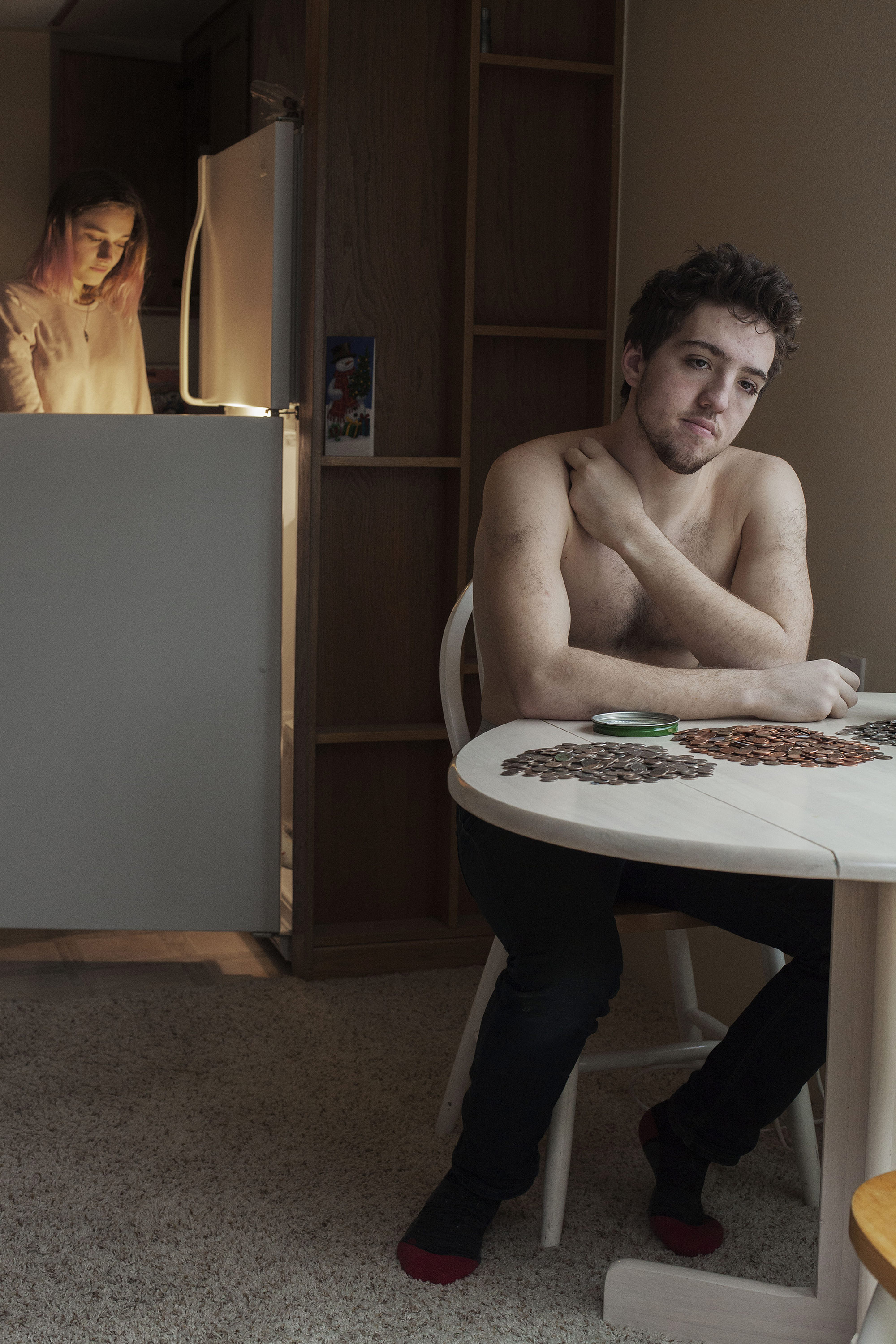
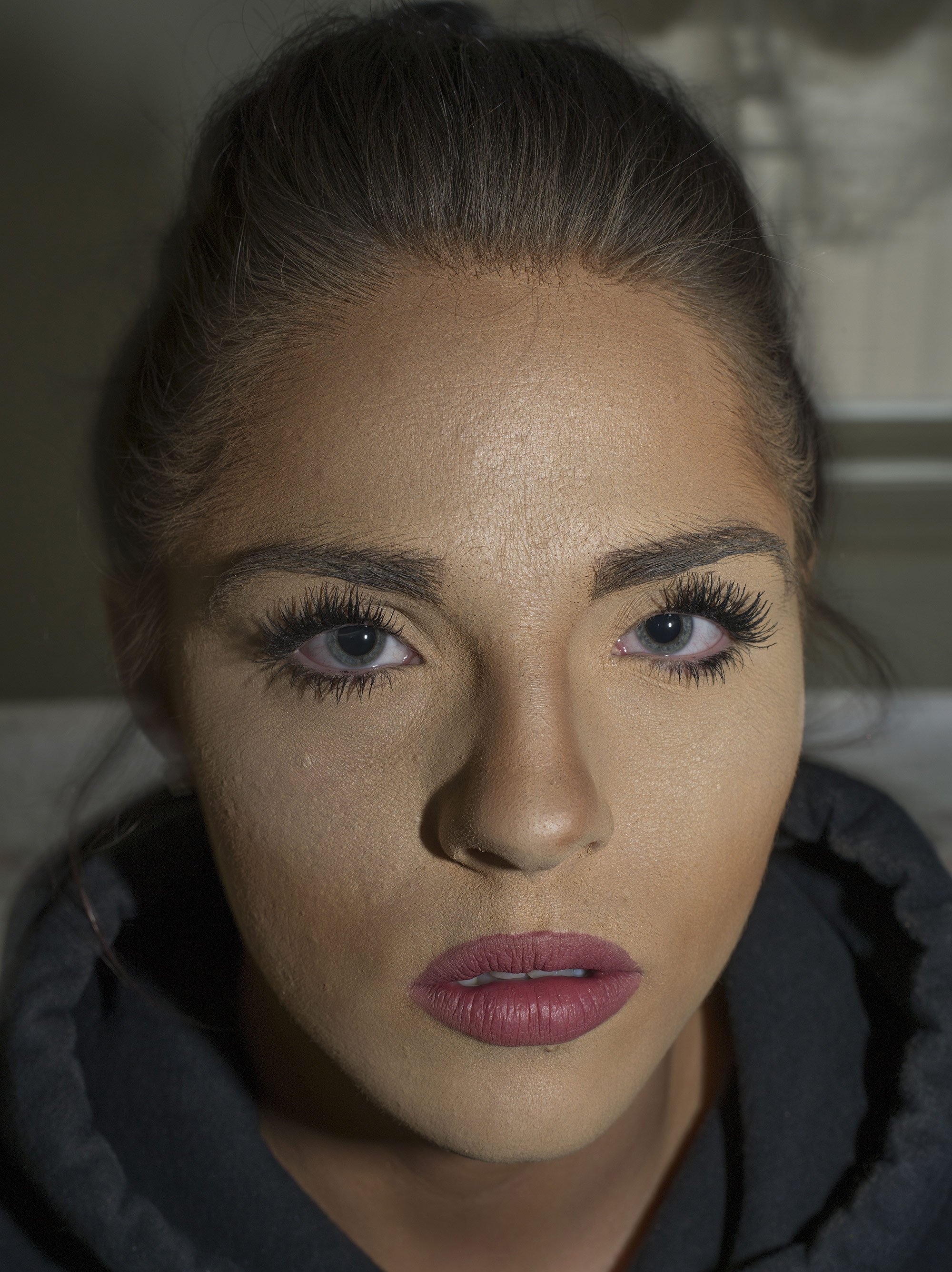
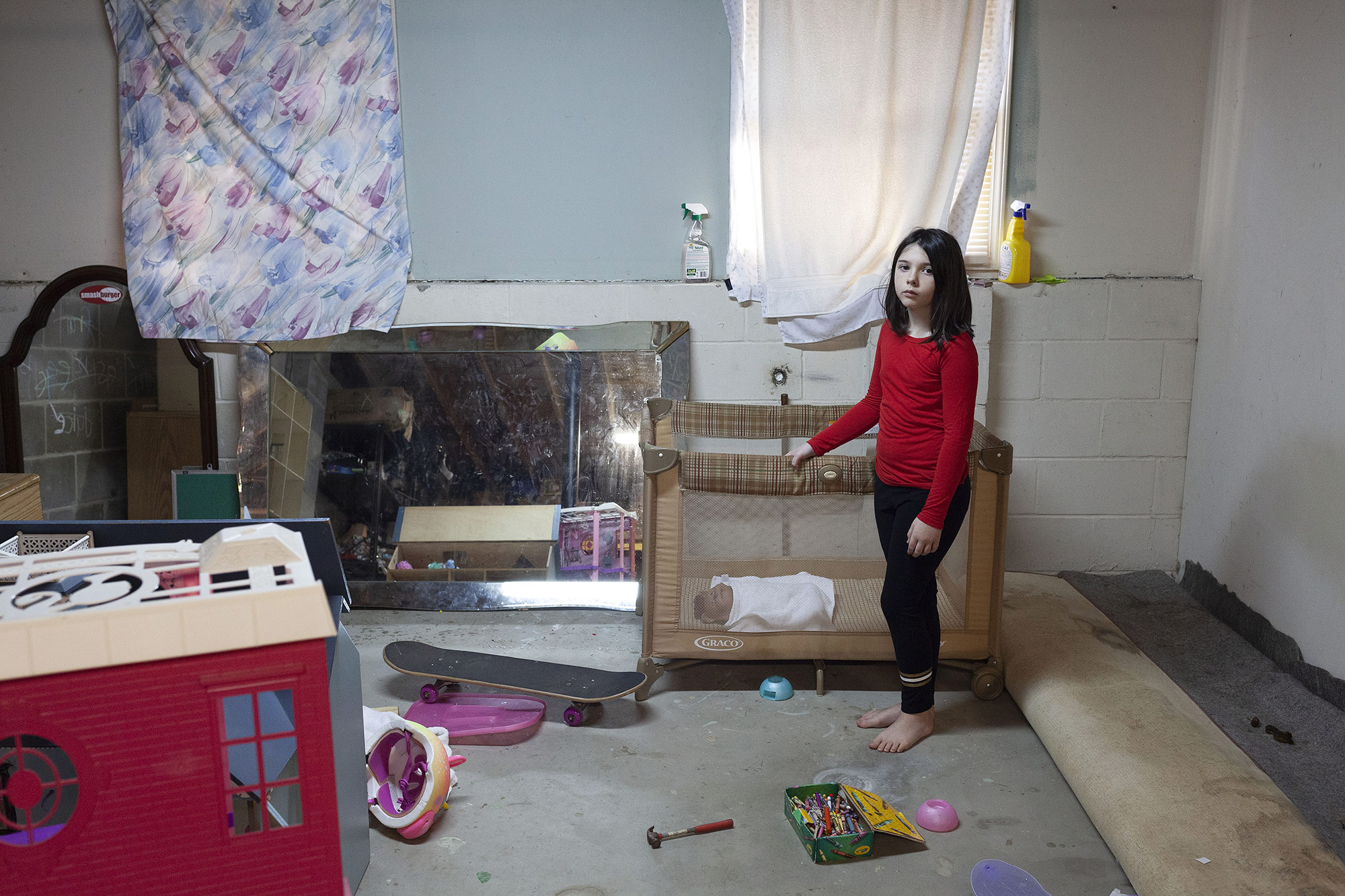
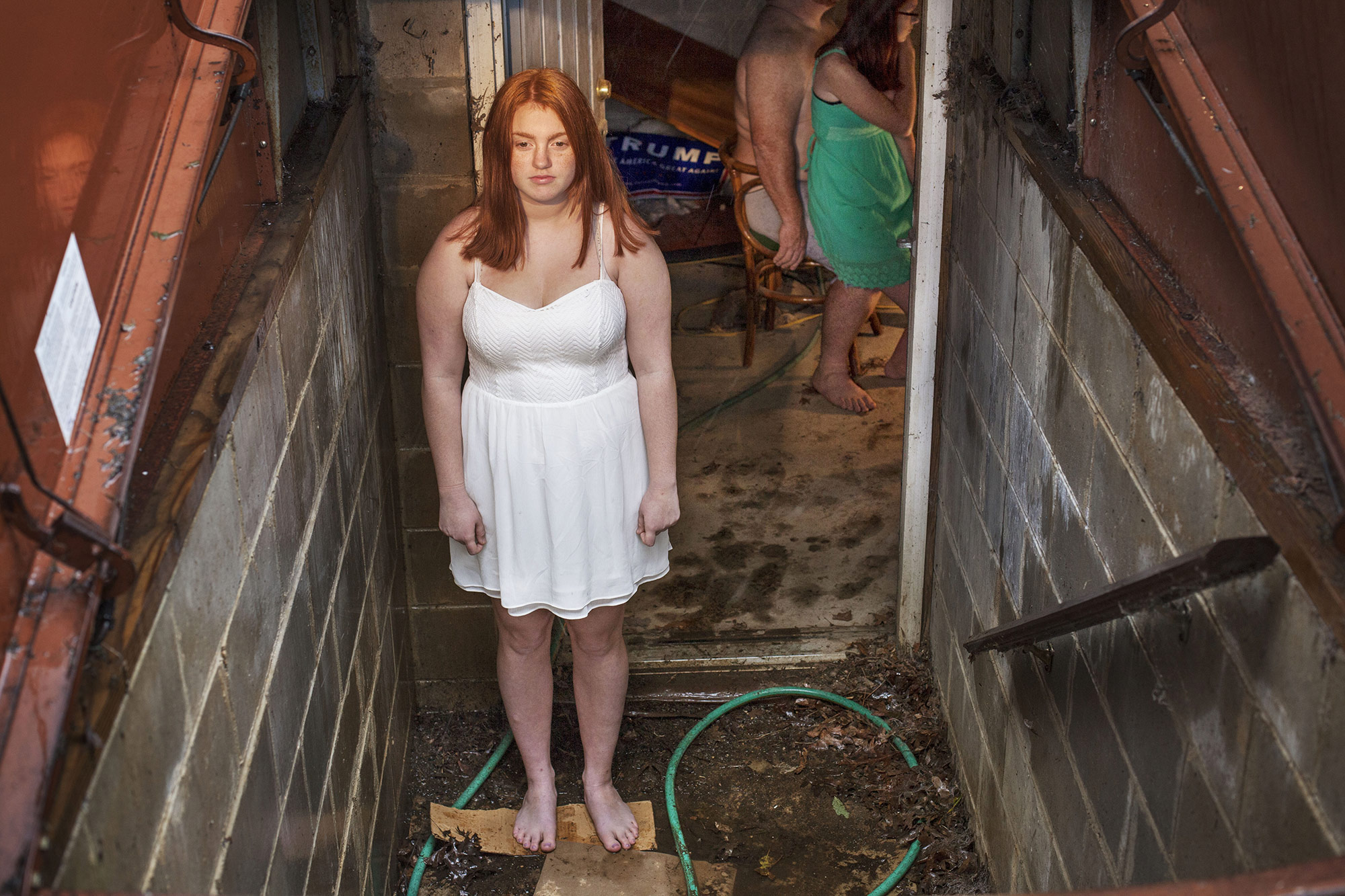
Lindley You blend together various shooting methods which creates a surreal aspect to the work. While looking at your photographs I often find myself wondering if the scene involved your hand or not, which is perhaps irrelevant because you are a strong editor and ultimately you always seem to find a way to say what you intend to whether or not the actual moment was constructed.
Danna Photography has had such a complicated relationship with “truth-telling” since its very beginning and I wanted to lean into that with this series. And so, the work moves between the directed formal image, traditional documentary modes and staged snapshots. The staged snapshots are the most interesting to me because they attack those relationships so directly. My aim is to push up against and blur those lines while still making work that is genuine and true. A lot of my pictures look at abuse in many forms and sometimes I have to create ways to say it and other times, I find it was there right in front of me, like an open letter.
Lindley You began If It Rained an Ocean in 2015 and it is still in progress. Where does it currently stand?
Danna After grad school, I took a long break from the work and thought it might be finished but in reality, I was just burned out. During the summer of 2018 Hannes Wanderer and I began working on, but never finished, a book of images from If It Rained an Ocean which was to be published by Peperoni Books, an independent Berlin based company owned and operated by Hannes and his brother. Sadly, Hannes passed away suddenly September of that year. His death was a great loss.
Lindley What is it about this body of work that keeps you interested?
Danna I studied under Gregory Crewdson, who believes that all artists have one central story to tell, and at its core, it is the defining story of who we are. I think that’s true. We are the sum of our histories, which often play out in cycles and that’s the thread that keeps me interested. I’m drawn to stories about the discarded, the things that are left behind. I make a lot of pictures about addiction, abuse and the emotional aftermath of living in a place where people fill their internal emptiness with anything that resembles love or escape.
The newer images that I started making in December of this year re-engage with the same ideas but dig a little deeper. They begin to create a family tree of sorts as they look at our history but in the next generation. I see a lot of myself in the young girls I’m photographing. I wonder about their expectations as they grow into adulthood and hope they demand more. I remember wanting more for myself when I was young but didn’t feel it was possible, or that I deserved it. I believed that most things, especially art, were for other people — people who were smart, rich and beautiful. There was an implied and then prescribed place that I belonged and that was in the role of mother and wife. Knowing your place was a big thing and to want more was perceived as an indictment of your family’s choices. My newer images confront these ideas pretty directly.
I’m not sure the story ever really ends and so the work will continue until I’ve said all I need to say. I’m not really that interested in the resolution anyway. I’m just looking to make a complete sentence about what it feels like and with any luck the viewer will feel that with me.
Lindley Is there anything else that you're working on that you can tell me about?
Danna I started a new series of images titled I’ll Be Here in the Morning in 2017 after my stay in a motel in South Jersey, not far from my home. Since then, I’ve traveled to Arizona, Texas, Florida, and Nevada making pictures in motels and I am heading to Colorado and New Mexico this August. My main interest is in describing the social and economic demographic who are populating these places. There are long-term residents, some receiving Section 8 housing, others working away from home looking for an affordable place to stay. There are working-class families on road trips and college students passing through for spring break.
My hope is to show a cross-section of America today, a project that both celebrates who we are, who we can be and looks deeper at those who might not be seen.
Danna Photography has had such a complicated relationship with “truth-telling” since its very beginning and I wanted to lean into that with this series. And so, the work moves between the directed formal image, traditional documentary modes and staged snapshots. The staged snapshots are the most interesting to me because they attack those relationships so directly. My aim is to push up against and blur those lines while still making work that is genuine and true. A lot of my pictures look at abuse in many forms and sometimes I have to create ways to say it and other times, I find it was there right in front of me, like an open letter.
Lindley You began If It Rained an Ocean in 2015 and it is still in progress. Where does it currently stand?
Danna After grad school, I took a long break from the work and thought it might be finished but in reality, I was just burned out. During the summer of 2018 Hannes Wanderer and I began working on, but never finished, a book of images from If It Rained an Ocean which was to be published by Peperoni Books, an independent Berlin based company owned and operated by Hannes and his brother. Sadly, Hannes passed away suddenly September of that year. His death was a great loss.
Lindley What is it about this body of work that keeps you interested?
Danna I studied under Gregory Crewdson, who believes that all artists have one central story to tell, and at its core, it is the defining story of who we are. I think that’s true. We are the sum of our histories, which often play out in cycles and that’s the thread that keeps me interested. I’m drawn to stories about the discarded, the things that are left behind. I make a lot of pictures about addiction, abuse and the emotional aftermath of living in a place where people fill their internal emptiness with anything that resembles love or escape.
The newer images that I started making in December of this year re-engage with the same ideas but dig a little deeper. They begin to create a family tree of sorts as they look at our history but in the next generation. I see a lot of myself in the young girls I’m photographing. I wonder about their expectations as they grow into adulthood and hope they demand more. I remember wanting more for myself when I was young but didn’t feel it was possible, or that I deserved it. I believed that most things, especially art, were for other people — people who were smart, rich and beautiful. There was an implied and then prescribed place that I belonged and that was in the role of mother and wife. Knowing your place was a big thing and to want more was perceived as an indictment of your family’s choices. My newer images confront these ideas pretty directly.
I’m not sure the story ever really ends and so the work will continue until I’ve said all I need to say. I’m not really that interested in the resolution anyway. I’m just looking to make a complete sentence about what it feels like and with any luck the viewer will feel that with me.
Lindley Is there anything else that you're working on that you can tell me about?
Danna I started a new series of images titled I’ll Be Here in the Morning in 2017 after my stay in a motel in South Jersey, not far from my home. Since then, I’ve traveled to Arizona, Texas, Florida, and Nevada making pictures in motels and I am heading to Colorado and New Mexico this August. My main interest is in describing the social and economic demographic who are populating these places. There are long-term residents, some receiving Section 8 housing, others working away from home looking for an affordable place to stay. There are working-class families on road trips and college students passing through for spring break.
My hope is to show a cross-section of America today, a project that both celebrates who we are, who we can be and looks deeper at those who might not be seen.